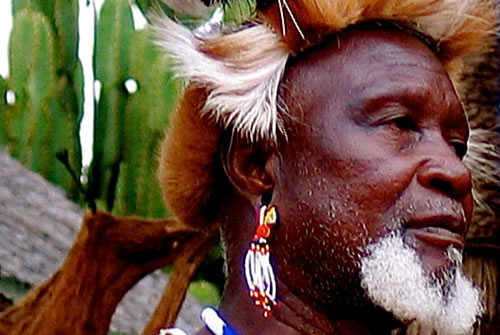Sep. 2000 Proverb: ” I have come a long way; the journey has exhausted me.” – Ngoni (Tanzania)
September, 2000
Nihumili kutali, lunikomi lugendu. (Ngoni)
Nimetoka mbali, safari imenichosha. (Swahili)
I have come a long way; the journey has exhausted me. (English)

Ngoni (Tanzania) Proverb
Explanation and Everyday Use
The Wangoni Ethnic Group lives mainly in Songea District in Ruvuma Region, Southwestern Tanzania. They originally came from Natal, South Africa. This proverb describes the typical situation of an aged person who has lived for many years. It also describes people who have traveled long distances while facing hurdles and many problems. Finally after having reached their destination, they relax and sigh with satisfaction. Usually the Wangoni people traveled on foot in rural areas to towns in order to get their basic needs. Even their ancestors had to travel on foot from Natal to Songea where they settled. The Wangoni people used to make several safaris from Songea to the coast (specifically Tanga) on foot for three or more months in order to become laborers in sisal plantations to earn their living. But nowadays people use modern means of transport.
So the elders always tell the young people to pluck up courage and persevere in their undertakings just as the old people did during those former days. Tavili tenga kadeni is another Ngoni saying describing that “we old people were what we were — courageous, old is gold, having a painstaking spirit. We encountered a lot hurdles and problems but managed to strive and live until now. We are incompatible with you youngsters!”
The proverb is also used to teach the young generation to be brave and to persevere until a person achieves one’s desired goals for life (compared to a journey). On the other side, the proverb stands as self-defense to the aged. Despite the fact that they are exhausted, they are firmly determined to reach their destination. Sometimes the proverb is used to laugh at the poor performance done by the young generation, etc. Other similar Swahili (Eastern and Central Africa) proverbs are as follows:
- Kuishi kwingi ni kuona mengi. (Swahili)
To live long is to see much. (English)
2. Jungu kuu halikosi ukoko. (Swahili)
A big cooking pot is not without hard-burnt rice. (English)
3. Iliyopita si ndwele, ganga ijayo. (Swahili)
That which has passed is not a disease; cure what is coming. (English)
 Biblical Parallels
Biblical Parallels
The obvious Biblical parallel is the journey through the wilderness from Egypt to Canaan in the Old Testament. Moses led the people of Israel through the desert where they encountered many problems: thirst, hunger, fatigue (Exodus 17). Another parallel is “The Song of Simeon” as described in the Gospel of St. Luke 2: 25-32. This is the story of the old Zechariah and his aged wife Elizabeth who miraculously gave birth to a baby son named John (Luke 1:57-66).
Religious Use
This Ngoni proverb can be used in many pastoral and social situations. For example, married couples both are to care for their children and grandchildren bodily and spiritually and also to love each other. Although we have come a long way, we have to be faithfully active in living and following the footsteps of Jesus Christ. For example, each one of us has to carry his or her own cross like Jesus Christ did in the Way of the Cross. Active Christians believe in a God of love who brought them by their faith into a life of promise and who has never, and will never, fail them. This knowledge and understanding sustains them and has enabled them, whether African or of the African Diaspora, not simply to survive but to thrive. They live their lives surrounded and immersed in faith in the one who came to set all captives free.
Assuming that Pope John Paul II is like an Ngoni, although he is partially incapacitated due to old age, illness and several attempts of assassination, he is a very well traveled man. As part of his celebration of the Great Jubilee in the year 2000, Pope John Paul II set a distinguished example of fortitude and perseverance and joined with the world Christian community to make a special pilgrimage to the Holy Land.
This proverb could equally be used in peacemaking and reconciliation for broken homes that result in street children. It could also be effectively used to strengthen relations and mediate disputes and other kinds of ethnic conflicts.
John P. Mbonde
P.O. Box 3479
Dar es Salaam, Tanzania
